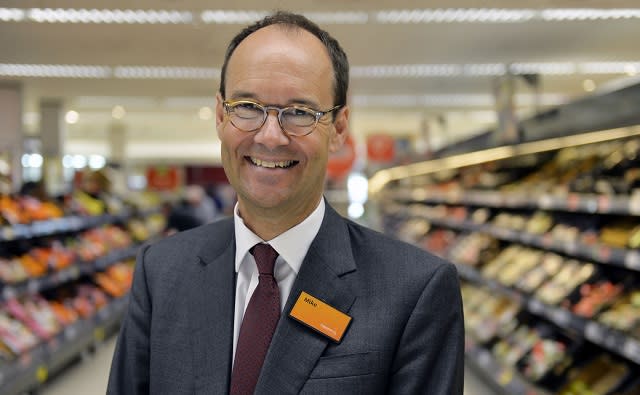'Age of the superstore is not over'

Sales are falling, profits have evaporated and new space is being opened at the slowest rate in a decade. But Sainsbury's boss Mike Coupe says he is now more confident than six months ago.
That is partly because customers are starting to buy bigger quantities of shopping at the supermarket even though they are spending less because prices are lower.
Mr Coupe also became the latest supermarket boss to back the idea that large out-of-town supermarkets will still dominate the future of the sector despite the rise of online and convenience formats.
Get Sainsbury's vouchers and deals
Meanwhile the advance of Aldi and Lidl appears to be slowing and, Sainsbury's claims, its own performance is not as bad as those of its rivals which have also been thrown into turmoil by the march of the discounters
Industry data today from Kantar Worldpanel appeared to bear this out with its latest decline in sales slower than those of competitors Tesco, Asda and Morrisons.
Mr Coupe said: "We are selling more stuff. We are selling it to more people. The weight on the business is the fact that there is 2.5% deflation. We believe that is going to be with us certainly until Christmas and probably beyond that."
Shoppers have £16 a week more in their pockets but they are not spending it on groceries, instead splashing out on televisions, cars and holidays, he said. Their improved finances have not yet translated into greater consumer confidence.
Sainsbury's has sought to keep up with the industry's price-cutting frenzy by announcing a £150 million investment into staying "toe to toe" with rivals and today poured in another £50 million.
But it argues that its more important focus, differentiating it from competitors, is on quality and range - saying some customers go to Sainsbury's because it sells products they cannot find anywhere else.
That is why it is being cautious about slimming down the number of lines on offer while investing, for example, in the biscuit base and the quality of cream in its own brand cheese cakes and the texture of its Taste the Difference burgers.
Get Sainsbury's vouchers and deals
Mr Coupe, presenting his first annual results since taking over from Justin King, last year, said: "We have a plan. We are executing it - five or six months into the execution of that plan.
"We have the financial resources to execute that plan. We have more confidence today that that is the case than six months ago."
The so-called "space race" of building more and more supermarkets has come to an end - and rival Tesco has been closing stores. Sainsbury's plans to deliver 450,000 sq ft of gross new space in the coming year represent the slowest pace of expansion since 2005/6.
Sainsbury's admits that it has 150 shops that are too big, and it is responding by putting in more clothing and general merchandise in about half of them, while the rest are seeing space taken up with franchises such as Jessops, Timpsons and Argos.
But Mr Coupe echoed recent remarks by his rival at Tesco, Dave Lewis, who said last month that big out-of-town supermarkets were perhaps not "the dinosaurs that people have painted them to be".
Sainsbury said that despite the rise of online and convenience stores - both formats where it is expanding itself - forecasts suggested supermarkets would still represent 60% of grocery spend by 2022.
Mr Coupe said: "We believe that fundamentally the age of the superstore is not dead. In the end the format of choice will be the large out-of-town superstore."
Despite the broadly positive rhetoric today, Sainsbury's executives were keen not to sound too optimistic that the worst was over.
Finance director John Rogers said: "At the moment there remains some uncertainty in the market. I wouldn't want to call the turn just yet."
Read more on AOL Money:
Special offers 'not that special'
Retailers 'trick shoppers with misleading packaging'
Sainsbury's cuts prices - and drops Tesco from Brand Match scheme





